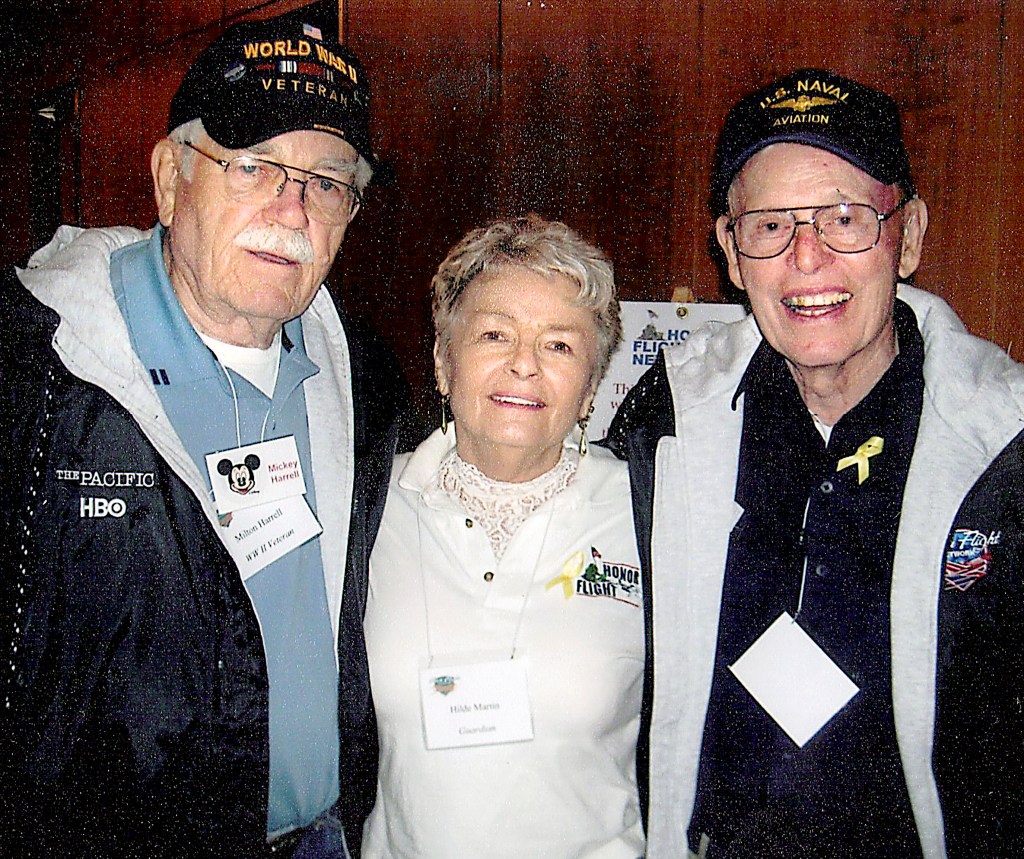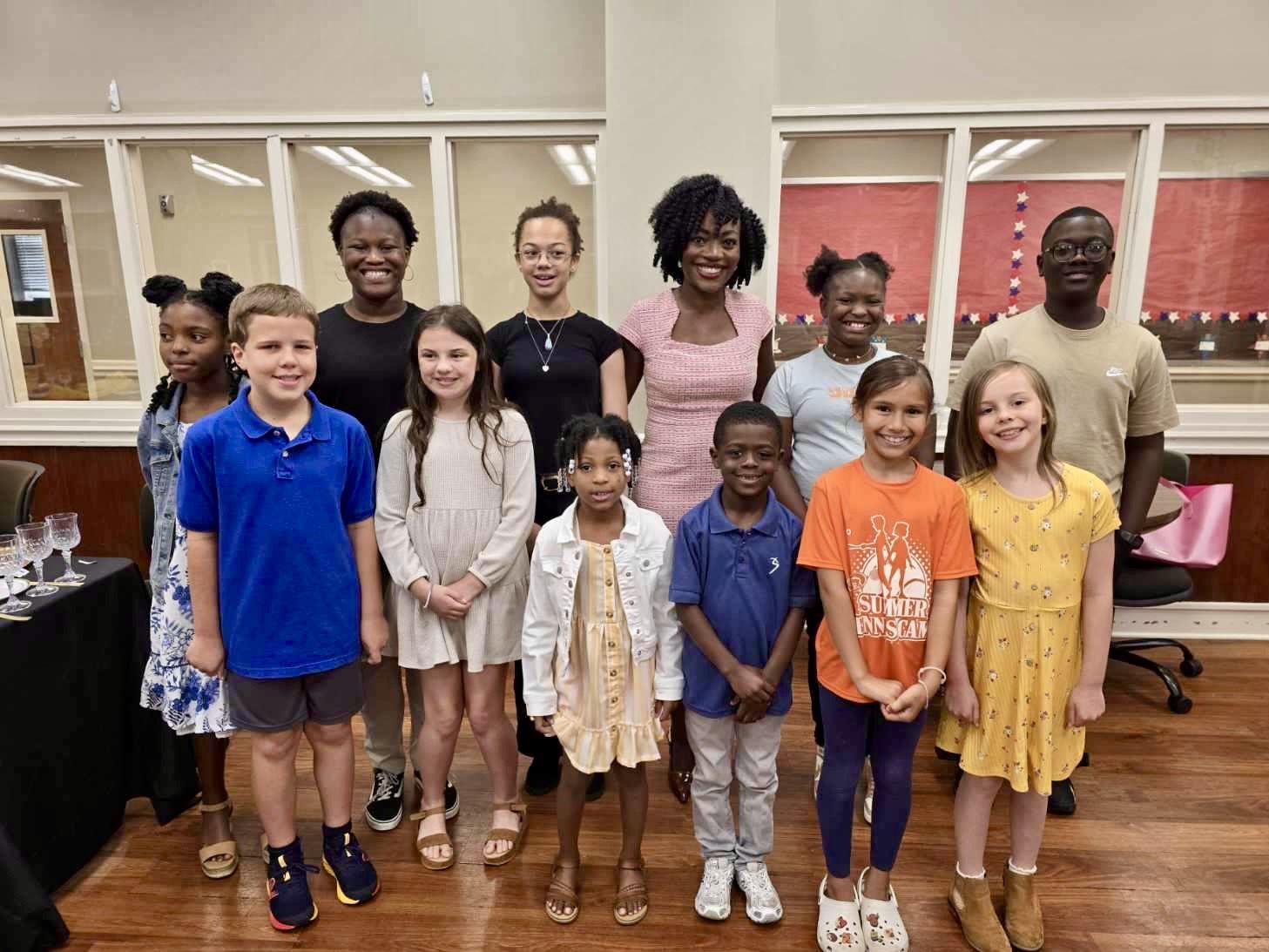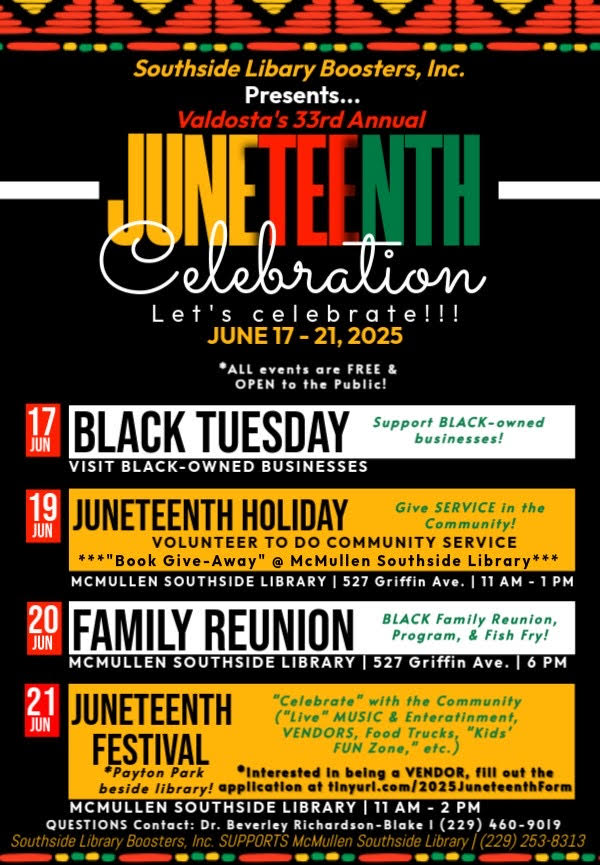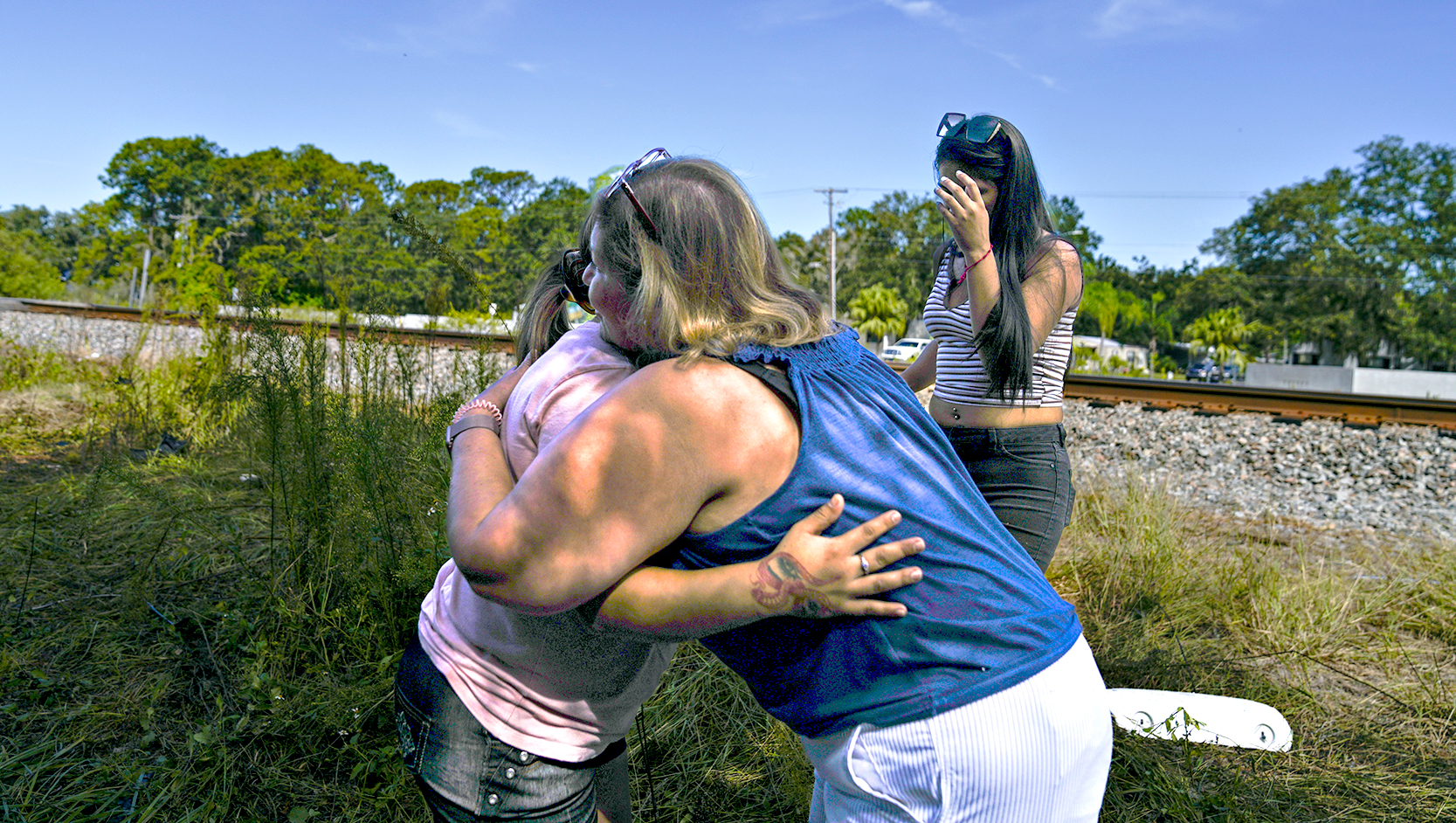From ‘Heil Hitler’ to helping U.S. veterans
Published 11:00 am Monday, September 19, 2011

- Hilde Martin went on an Honor Flight to Washington, D.C., on March 11, 2010, for veterans who served in the Pacific Theater. She was a guardian for Micky Harrell, left, and Ed Norton.
As an elementary student, German-born Hilde Goerigk Martin of Valdosta got to see Adolf Hitler when he came to Bischofstein, East Prussia, to dedicate her new school named after him.
“Yes, I did see Hitler but did not shake his hand,” she recalled. “In 1943 when I entered the first grade of school, it was in a very old school building. Less than a year later, we moved to a new school, and it was named: ‘Adolf Hitler Schule.’ Hitler came to dedicate our new school. I can remember wearing black shoes, blue skirt and a white blouse. It seemed like we waited for hours for him to arrive. He did come, standing in a military vehicle, riding by us. Everyone had to give the salute and shout ‘Heil Hitler.’”
Two years later, she would live through the horrors of Russia invading Germany, watching “Russians shooting somebody” and being threatened herself with an automatic weapon pointed at her by a Russian soldier.
Today, Martin is not only a member of an organization helping U.S. veterans, the American Legion Auxiliary Unit 13, Valdosta, but this year, she also became the first Valdostan since 1943 to rise to the office of state president for the American Legion Auxiliary. Just before she left for the auxiliary’s national convention in
Minneapolis, Minn., Aug. 27 through Sept. 1, she came by The Valdosta Daily Times to talk about her accomplishment and those grueling experiences in her homeland of Germany more than 60 years ago.
Hilde was born on Dec. 18, 1936, in East Prussia, Germany, near the Poland border. In 1945, she was living in Bischofstein, Germany, with her mother, the late Anna Goerigk; her brother, the late Heinz Goerigk; her grandmother, the late Anna Kalzki; and her cousin, Anneliese Kalzki.
Her father, Franz Goerigk, was a submarine builder in Danzig, Germany. He had written for them to pack up and join him there. A submarine was going to transport refugees to Bremerhaven, Germany.
“But we never got the letter,” she said.
Her father went on with the submarine.
“Russia and Poland invaded us,” she said.
In February 1945, the Russians came into Germany. Hilde and her family stayed in Bischofstein until October of that year.
“We had nothing to eat or drink because all the stores were bombed out, and the city was burned.”
Hilde’s mom put 8-year-old Hilde and her 3-year-old brother on a sled and took them to Grandma Anna’s house in another part of the city.
“The night the Russians invaded us, the bomb went into one side of our house. We were in the basement. We had no electricity, no water, no gas.”
For nine months, they lived that way.
Her mother and cousin were seized by the Russians who were going to take them to Siberia.
“It was awful. We went out in the field and picked up wheat, cleaned the kernels and ground them into flour with coffee grinders. And Grandmother would make bread. That’s how we survived.
“The Russians would come every morning and get the women and girls and rape them. It was a wild life for the young soldiers because no (Russian) commander had been appointed. My aunt was raped and had a little girl later on.”
The German children were not shielded from seeing the rapes.
Hilde’s mother and her cousin escaped by jumping off the train they were on, and returned home by foot after two months.
“They could only run at night,” Hilde explained.
In October 1945, the Russians decided the Germans could leave if they “didn’t take a Polish name (with them).”
One morning they loaded her toddler brother and her grandmother, who had hurt her leg, onto a sled. The Russians led the group of Germans as they walked for days and days. The Germans had taken up the rails thinking that would keep the enemy out.
“We finally came to a station, and they put us on a cargo train. We stayed on the train for two weeks, and all we had to eat was bread and water. The cousin, my mother fled with, committed suicide. It was horrible (so horrific that Hilde doesn’t watch any war movies today). There was a mother lying on the ground dying from exhaustion and starvation with her children around her and people running over them.
“Everything we had taken from home we lost or we had to throw away.”
After two weeks and being wet from the rain, they stopped in Mecklenburg, East Germany, and the German Red Cross came. There were farmers standing there who took the German refugees home with them.
“My mother wrote to her sister in Berlin. My aunt came within two weeks, and she told us my dad (in Brehmerhaven) had written to her (that) if she finds us to come with the help of the Red Cross, and we did. We left our grandmother there because she was unable to go with the injury to her leg.”
In December 1945, they arrived at the border going from East Germany into West Germany. At a restaurant, her mother talked to a German soldier and gave him her ruby ring and some money in exchange for taking them over the border.
“We went through the fields and saw the beams of light fanning across the field, and we would fall down flat so they wouldn’t see us. We saw the Russian soldier (guarding the border) with a German shepherd dog. The German soldier told us to run when the Russian soldiers both had their backs to us. Through the fence, a lady talked to us and wanted to know where we were going. She opened the door. It was just like stepping into heaven: There was music and happy people laughing. They gave us a good meal and then stripped us and gave us a bath because we had been infected by lice. We got new clothes and we told the Red Cross where my dad was, and they put us on a train.”
A few days later, they were reunited with her dad in Mulsum, Germany. It was after Christmas.
“We had nothing. We started from scratch.”
For a month, they stayed in the room her dad rented. Her dad was making “fairly good” money as a shipbuilder. Later, they would rent an apartment with two rooms.
“But still, we were free. We could go to the store to buy something. We could eat.”
Hilde had lost a year of school. She went to elementary school for six years and then four years to middle school and graduated. There was no high school. She went into a Catholic home for a year where children had been taken away from parents due to not being able to raise them.
“(The nuns) taught us nursing, sewing, bookkeeping and religion. We sewed clothes for the children.”
Hilde went to a Catholic hospital in Bremerhaven and became a licensed practical nurse. She started schooling to become a registered nurse, but one night, she and her girlfriend went out dancing, and she met her future husband, R.D. Martin, who was in the U.S. Air Force.
When he saw her, he told himself, “That little girl in the red skirt is going to be mine.”
Eleven months later, she was. Hilde married the Bossier City, La., native in 1959. Two years later, their son, Richard, was born.
Martin was transferred to Barksdale Air Force Base in Bossier City, La., where he and his family stayed three years.
“I decided to become a citizen because I was afraid if Germany and the U.S. got in (another) war, I would be deported and forced to leave my child and husband behind,” Hilde said. “I decided to study for the citizenship test. I became an American citizen in Lake Charles, La., in November 1963, one day before John F. Kennedy was assassinated.”
In January 1964, the Martins went to Germany for another three-year tour. Their daughter, Sandra DiPietro of Valdosta, was born the following year. Martin’s next assignment was Austin, Texas. A year later, her husband had orders to go to Vietnam for a year. She moved back to Louisiana with their children. After he came home, he got orders to Germany in 1969, where they stayed seven years.
“He was in intelligence and spoke fluent German,” she said.
Martin received orders for Moody AFB and then Alaska, but she remained for her son to graduate from Valdosta High School in 1979.
“I had met a lot of German girls here. We formed a coffee klatch and, each Wednesday, we met at a different home, and now we do it every other week.”
In 1992, Hilde met Lucille Windham, who talked her into joining the American Legion Auxiliary Unit 13, Valdosta. She has served for 15 years as a counselor with the auxiliary’s Girls State program held annually at Georgia Southern University in Statesboro.
“This program teaches high school juniors about our form of government,” she said. “It is a very intense program lasting one week and involves approximately 300 girls from around the state of Georgia.”
Hilde is also a volunteer with the Veterans Administration Medical Center in Lake City, Fla. Georgia veterans in the 19 southern counties of Georgia receive their medical attention at that hospital.
“I travel there almost monthly, taking items for their daily needs and also playing games with them,” she said. “The patient population at Lake City is primarily composed of nursing home patients. It is a joy to see their faces when I show up for various activities.”
When she is asked why she serves U.S. veterans, she tells the story of sitting with her mother in a streetcar in Germany in 1946. An American soldier was eating a Hershey’s candy bar.
“I kept looking and looking … He broke off where he had eaten and gave the rest to me. During the war, we had no chocolate. I connect that with giving back to the veterans: He gave to me; now I give back to the veterans.”
She has been on three Honor Flights from Valdosta to Washington, D.C., as a guardian. Her last Honor Flight from Orlando, Fla., on March 11, 2010, was for veterans who served in the Pacific Theater, and was sponsored by HBO with Steven Spielberg and Tom Hanks.
Veterans are also close to her heart because her son, Rick, was a lieutenant in the U.S. Navy, and his wife, Sandy, is still active duty as a lieutenant colonel in the U.S. Army; she recently returned home to Mililani, Hawaii (just north of Honolulu), after an eight-month tour in Afghanistan.
Hilde worked her way up the ranks of the American Legion Auxiliary from state chaplain to historian, second vice president and first vice president. She was installed as the Georgia president June 26 at the state convention in Dalton.
“It is indeed an honor to represent my local unit as well as the City of Valdosta and Lowndes County,” Hilde said.





